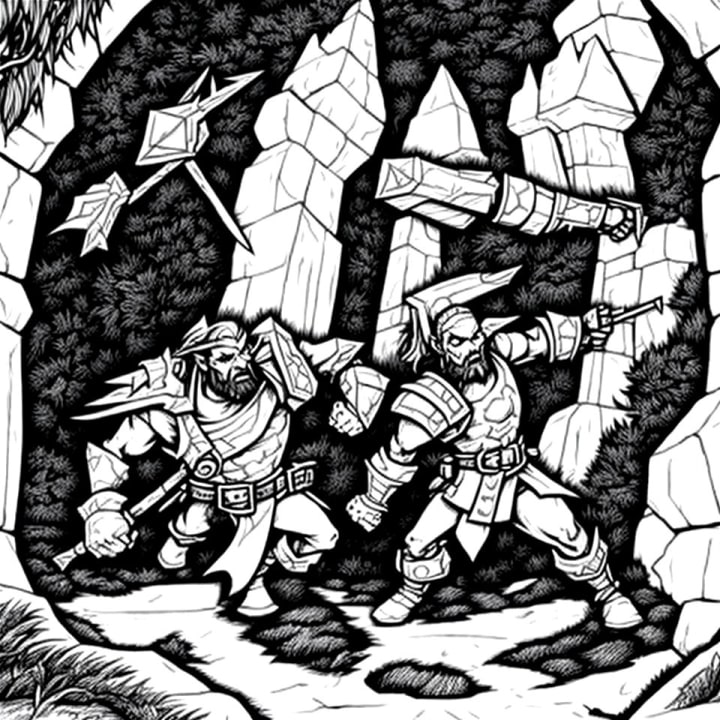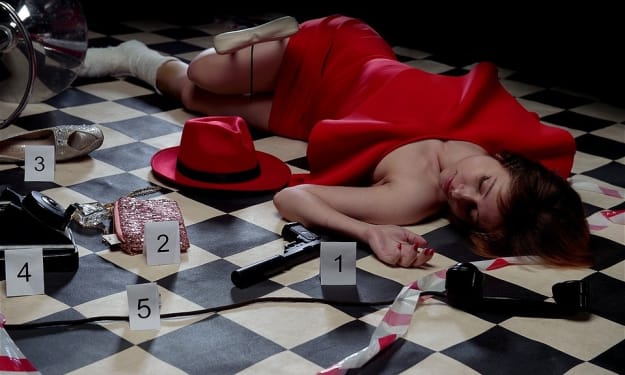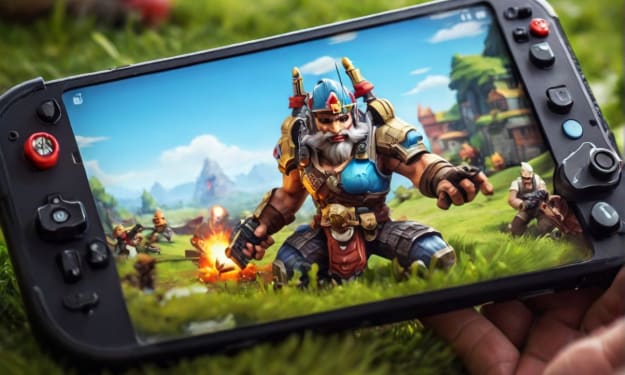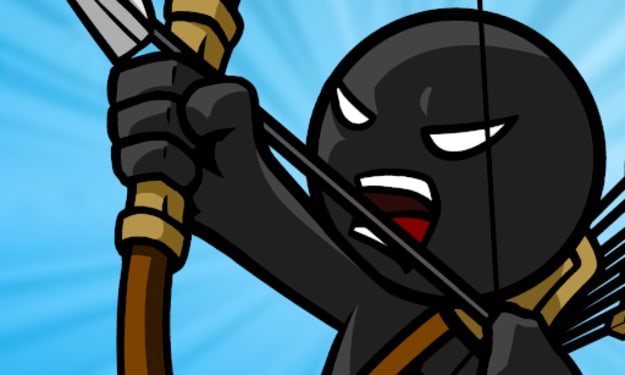
Note: I am doing a video version of this tutorial I will post here upon completion. An ebook and print version will be available once those are complete, and will both include a huge section of d100 random tables for genres such as fantasy, science fiction, space opera, cyberpunk, horror, slapstick (based on silent films such as those of Chaplin and Keaton), superhero, and Western. To read my previous articles on solo TTRPGs, click the links below.
2. "Castles and Caverns: Solo Tabletop Roleplaying" Game (Parts 1 and 2)
3. "Castles and Caverns: Solo Tabletop Roleplaying Game" (Parts 3 and 4)
4. "The Data Heist" (Cyberpunk)
5. "My Name is Max" (Fiction based on a roleplaying adventure)
6. "The Murder Party" (Solo journaling RPG)
Also, while, as noted, the images here are AI-generated, THE WRITING IS ENTIRELY MINE.
Introduction: What is a "Roleplaying Game," anyway?
Roleplaying games, that is, games of fantasy and adventure in which several players take on various roles in an imagined setting, one player being the "Gamesmaster" or referee, and, by a series of game mechanics or dice rolls, determine the outcome of actions in that fictional world, are usually thought of as being group activities, requiring two or more players.
However, roleplaying games (also referred to as RPGs), CAN BE and ARE played by solo players, who take on the role of Gamesmaster, as well as sole PC (Player Character) or even several of them, for the duration of the gaming session. This can allow for play when no group is available, and allows the sole enthusiast to engage his or her hobby exclusively, and test the limits of their imagination.
This has become an increasingly popular alternative in recent years, with gaming supplements aimed at solo players, such as the Mythic GM Emulator and Loner, as well as easily adaptable, rules-light "micro RPGs" and journaling RPGs becoming increasingly popular with hobbyists. These can cover every conceivable genre, to the traditional sword and sorcery-style gaming popularized by Dungeons and Dragons, to Gothic Horror, Cyberpunk, and even stuff that is extremely offbeat.
The secret to fantasy roleplaying games, especially from the solo perspective is that there is no right way or wrong way to do it--after all, it's YOUR game, you are in total control. You can sit back with a pen in hand, a pair of dice, and let your imagination just soar. You don't even need to start with a fully fleshed-out character, but can simply decide the character, genre, and "plot" of your adventure as you go, rolling an "oracle" and asking yes/no questions, or rolling against a table of word "prompts."
Having said that, this tutorial will demonstrate some common methods for the newbie to get started on playing their solo adventures. The author is a soloist himself and hopes this small guide will help others discover the hobby that has so enriched his life. Let's begin!
First, we're going to decide the genre of the game we want to play, the setting, the "plot" or storyline of our adventure, and then what character (or characters) we are playing. Whoa! That's not as complicated as it all sounds, so never fear.
Genre
So let's decide what GENRE we're playing in. Is it traditional "High Fantasy," such as classic Dungeons and Dragons? Is it cyberpunk? Horror? Space Opera? Or, is it something even more offbeat and weird? You can decide right off the bat, or you can simply mix and match genres, come up with your own, or let it (as well as the setting, plot, and even your PC or NPCs (Non-Player Characters, or stock characters) emerge organically from your imagination or interpretation of the word prompts or answers, as you go.
Developing a character can be as easy as grabbing an index card and writing down a name, occupation, backstory, a set of skills or abilities, and anything else you think of as being pertinent to this fictional alter-ego you're inventing. Then, you can take that character and, imagining him or her in various situations, roll against the "oracle" (more on that later) to determine a yes/no question (such as: "Is there a troll hiding in the closet?," or, "Is there anything of any value in this room?").
The "Oracle"
Developing a character can be as easy as grabbing an index card and writing down a name, occupation, backstory, a set of skills or abilities, and anything else you think of as being pertinent to this fictional alter-ego you're inventing. Then, you can take that character and, imagining him or her in various situations, roll against the "oracle" (more on that later) to determine yes/no questions (such as: "Is there a troll hiding in the closet?," or, "Is there anything of any value in this room?")...
The randomness is what makes it a "game" (the plot twists, prompts, and the oracle are all usually determined by dice rolls or card pulls), but it is your mind and imagination that fill in the blanks, the gaps left by the yes/no questions or elaborate on the prompts, giving them meaning as regards the story, setting, or plot you're playing.
You can use whatever style of oracle you want--from a D6 roll to pulling cards (reds are yes, blacks are no), to just flipping a coin. Either way, you determine the answer to closed (yes/no) questions, and this can be useful in "finding out" even small details, and letting the setting and story emerge "naturally," or randomly.
If the question you have is more open-ended, you can forego the Oracle and use a "Muse": a table of single-word prompts, either prepared by yourself, a computer, or AI program, or pulled from a book or dictionary a random. Books such as Basic Roleplaying System Solo and Loner Solo RPG, or Solo Old-School Essentials have tables of such single-word prompts. This can be great for solo journaling games, in which, typically, all the traditional elements of roleplaying games (besides the random rolling up of word prompts) are discarded, and the prompts drive the action and story forward, based on the player's interpretation of the prompts. Note: Some dispense with dice entirely, and just pull playing cards or tarot cards. The tarot cards can be interpreted, in the context of the story and the questions posed, based on their imagery or classic interpretation, or the player's interpretation.
Sample Oracle Table (1d6)
1. Most certainly NO!
2. No
3. Inconclusive
4. Yes
5. Yes, Because...
6. Most definitely YES!

Creating a Character
As far as characters (PCs and NPCs) themselves, usually, beyond just descriptions there are 4-6 "Attributes" based on the ones outlined in classic Dungeons and Dragons. These are Strength (St), Dexterity (Dex), Fortitude (Fort), Intelligence (I.Q.), Charisma (Char), Perception or Wisdom (Wis). You can use all of these, rename them, use as few of them as you want or need, or forego ALL of them and just rely on description, logic, rolling the oracle table, the muse, drawing cards, etc. Freeform, open-ended RPG style playing allows for the player to determine outcomes in the game world however they feel most comfortable doing it. After all, it's YOUR game; as long as you're satisfied, who can say you aren't playing it right?
To determine attribute scores, you can roll a d6, 3d6, a d20, a d100 (percentages), draw cards (using the numbers on the suits, the suits themselves can represent attributes; Strength, for instance, in my "homebrew" system, is represented by the suit of Spades), or just assign points based on a baseline. Whatever way works best for you. You can further assign a "modifier" (a number added to or subtracted from a dice roll to simulate a player's advantage or disadvantage) based on a calculation of each attribute or use the attribute score itself on a d20 or some other roll.
This can be a "roll over" system or a "roll under": i.e. you can either try and hit the attribute score (adding the score's modifier to the roll) or above, based on a "difficulty score" you either assign based on circumstances, or roll at random, or attempt to roll below your attribute score (the modifier, in this case being subtracted from the roll, to get a value BELOW the attribute score). So, for example, you have an attribute score for Strength of 7, giving you a + or - modifier of four, you attempt, in a roll over system, to get a seven or higher. You roll a five, but with your modifier, you get a score of nine. Your PC "succeded" at whatever action they attempted (using Strength to open a door, pick up a heavy table, etc.).
It works the same way for a "roll under" system, with the exception that the positive or plus modifier is now subtracted from the number rolled (or the number on the card drawn), to try and get a number equal to or below the attribute score.
And it is as simple as that, although you don't have to use ANY of that if you don't want to. As a soloist, you could just ask the oracle, or, in a free-form or journaling game, go based on the context of the narrative unfolding, interpret cards, etc. It's all up to you.
Next, we have the skills and abilities of a character, things they can and cannot do based on their occupation, class, innate abilities, etc. This can be as simple as just deciding what those skills are based on the character's history, or assigning a dice roll or score to each skill/ability (skills are learned, whereas abilities, especially in a superhero game based on comic book tropes, are things that are innate to the character.
Again, how you proceed with skills/abilities and determine how and how not they can be used and are effective, is up to you. You can roll a 1d4 or 1d6 and use the value as an extra modifier on top of your other, most applicable attribute, or do an oracle roll to determine " did my ability or skill come of use and work here?' Interpret based on the outcome of that roll.
Note: The "Oracle" to which we're referring is a roll against a random table of outcomes, or can be as simple as flipping a coin, heads equals "yes," tails equals "no." If you use a 1d6 roll as your oracle, you might have all the equal numbers equal "yes," and the odds equal "no." Or vice-versa. You might have a table of 1-6, with one equaling "Extreme No," two equaling "No," and three equaling "No, But..." (the modifier has to be interpreted along with the No). Four might equal, "Inconclusive," and five and six might equal "Yes," and "Yes, and Also..." All are to be interpreted in the context of events of the game.

Combat
The rest of creating the character is just filling in the background, deciding on what equipment (if any) the character has with them, money (if any) they have if you are going to use the concept of "leveling up" (levels of experience for each character), and XP (experience points based on finding treasure, completing tasks and challenges, killing monsters or bad guys, etc.), and maybe providing or drawing a picture of them. If they have weapons or armor, this might add to their ability to take damage or cause it during combat or fight (more in a moment). If they have HP (hit points, or the ability to take damage) or you don't even worry about that, roll up DMG (damage) on a random table (1 being "lightly wounded," 2 being "wounded," three being "seriously wounded," four critical, and anything above five being "badly wounded" to "incapacitated." But this is just one example.) Weapons can add or subtract a modifier to this roll, with lighter or melee weapons, such as a "bludgeon" (mace, hammer, etc.) adding a small amount of damage (1d4 perhaps) and heavier ro ranged weapons having heavier damage (1d6, 2d6, 1d8 for instance). Damage and like modifiers can be subtracted from the total HP. If a character, PC or otherwise, reaches zero HP, they may be incapacitated or even killed. Modifiers can be added due to losing a third or half HP, and a PC may be able to roll a "Saving Throw" against Fortitude, for example, to take half damage. (Or, in the case of being hit by a weapon that might instantly kill, a roll to see if they even live! But this is also optional, of course.)
Environmental factors can also affect combat, such as terrain, distance, encumbrance a PC is carrying, etc. You, as the soloist, can decide these factors, ask the oracle, or just gloss over them in a "theater of the mind" style of play. The choice is up to you, based on your preferences, and your style of play.

Dungeon Crawling
A "Dungeon Crawl" is a term used by fantasy roleplayers primarily, for the sometimes rules heavier tabletop "simulation" of a character or party of them (as a soloist, you'll be playing all the sidekicks or other PCs, and all the NPCs or "Non-Player Characters" as well) going through a "dungeon", killing monsters, collecting treasure and weapons, etc. It can be played on a vinyl dry-erase board, or you can use graph paper taped to the table, hex paper, or even just sketch on notebook paper as your party of intrepid adventurers proceed through room after room. If using a dry-erase game grid or board, you can place miniatures on the squares, and get down to the nitty-gritty of distances, directions, etc. depending on how detailed and exacting or loose and fast-paced you want your game to be. Remember, you can play with a game grid and miniatures, or do everything entirely "theater of the mind," in as fast and loose a style as you want. It's all up to you.
One method of creating rooms is simply to roll a d20 and if, say, you get a sixteen, for example, the room is sixteen squares, each square representing about ten feet (a PC being able to move around sixty feet in one turn). You could then roll a d4 to find the number of exits leading out to the next room.
Alternatively, you could draw cards from a standard card deck. Based on the value of the card drawn, you could double that number (for instance, draw the Four of Diamonds, and your room has eight squares in it), and then halve the number for the number of exits. Based on the suit, for instance, diamonds being "treasure", you might roll your perception to see if you actually find treasure in the room, or simply ask the oracle, "Is there treasure here?" Spades could equal "weapons," hearts equal potions, and so forth. Face cards, Kings, Queens, and the like, can equal either re-rolls, random events, "good events," but we suggest spades always equal MONSTERS.

Monsters
Monsters, randomly encountered, need few to no detailed stats except what you need to "hit" them, what they roll in defense, and what damage they do (this can be extended, such as in the case of a vampire, for several turns, even if the monster is defeated. The "infection" may still plague the PC, and they may need to make a series of saving throws or have recourse to magic or a spell, to NOT themselves eventually become a vampire, werewolf, zombie, etc. (Alternately, a system using "chaos dice" can be utilized, wherein several d6 dice can be rolled intermittently, say four to six based on the likelihood of an event occurring, and the dice yielding a six can then be subtracted. When there are no more dice left, the event "occurs, unless otherwise somehow halted.)
Spells and Psychic Powers
Spells can be handled like abilities, and so-called "psychic powers" (if your world has them) can as well. Or you can simply ask the oracle if this spell is a success. If so, figure out or interpret the parameters of the spell, the area it affects, for how long, etc. You can decide this beforehand, make a table of spells to roll against, ask the oracle for details of each spell, use your imagination, what-have-you. It's, once more, YOUR game; you can have as detailed or as primitive a style of play as you feel comfortable with, playing on a game grid, with miniatures, where every detail is accounted for (including modifiers for distance, fatigue, food, drink, torches, visibility, terrian, and on and on), for a very exacting (but potentially slow and tedious) "simulation game." or you can play fast and loose with the rules, keeping some mechanics,m dropping some rules, adding them here and ignoring them there. Anything to advance the story.
Journaling
It is recommended (but not necessary) to keep a "journal," or at least, notes on what happens as you dungeon crawl, roll the dice, have encounters, and come up with threads or subplots, details that might occur to you during play. Of course, if you are playing a strictly "journaling" game, you will do this anyway. You can write this third-person, first-person, or even second-person (the "You" becoming You the solo player), or even write it like a piece of fiction, one where you have an invisible co-author in the Oracle and the dice rolls. The creative possibilities are endless, and just as easy as picking a setting, creating a character to occupy that setting, coming up with a plot, and establishing a first scene. Then, you put yourself in that scene, grab a pen, a paper, some dice--and presto! You're off and running.
There isn't much more to add. You're a smart cookie and can figure the rest out for yourself. We hope this small guidebook sees you open the pages and turn on the creative fountains of imagination that are ever-flowing, and waiting to take you to worlds undreamt of, worlds of fantasy, science fiction, gothic horror, cyberpunk, steampunk, superhero adventure, and so much more! Play as a costumed hero, elf fighter, spellcasting mage, vampire killer, werewolf hunter, or cowboy out on the badlands. The choice is yours, and yours alone.
Happy gaming!
Bibliographic Note.
Some of the books I found useful in crafting my style of homebrew play include The Mythic GM Emulator by Tana Pigeon, Solo Micro Horror RPG by Noah Patterson, Loner by Zotiquest Games, Solo Old-School Essentials by Peter Rudin-Burgess, Basic Roleplaying System (Solo) also by Peter Rudin-Burgess, The Ultimate Micro RPG Book - Edited by James D'Amato, The Top Ten Games You Can Play in Your Head by Yourself - Edited by Sam Gorski and D.F. Lovett , and The Storymaster's Tales - Tome of Terror: Transylvania by Oliver McNeil. You can look all of these books up online. Now, if you'll excuse me, I have to go behead a goblin. Ciao.
To view our various videos about Solo RPG Resources, click below for the playlist:
About the Creator
Tom Baker
Author of Haunted Indianapolis, Indiana Ghost Folklore, Midwest Maniacs, Midwest UFOs and Beyond, Scary Urban Legends, 50 Famous Fables and Folk Tales, and Notorious Crimes of the Upper Midwest.: http://tombakerbooks.weebly.com






Comments (1)
Oh, why behead the goblin when you can just tickle its toes & incapacitate it with laughter. (You said it's my game & I can make up the rules, lol.) Another interesting & helpful resource to something I just might have to try one of these days (or nights).